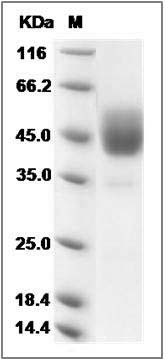-
Product Name
Rhesus ALK-7 / ACVR1C (Fc Tag) recombinant protein
- Documents
-
Description
ALK-7, also known as ALK7 and ACVR1C, belongs to the ALK family. It is a type I receptor for the TGFB family of signaling molecules. TGF-β is the prototype of a protein superfamily which, in humans, contains at least 35 members, including activins, inhibins, bone morphogenetic proteins, growth/differentiation factors, and Müllerian inhibiting substance. ALK-7 is a serine-threonine kinase that can cause the activation of one of the SMAD signal transducers, SMAD2. ALK-7 has a ligand known as Nodal. Nodal stimulates the secretion of TIMP-1 and inhibits matrix metalloproteinases MMP-2 and MMP-9 activity. The overexpression of Nodal or constitutively active ALK-7 decreases cell migration and invasion, whereas knock-down of Nodal and ALK-7 has the opposite effects.
-
Protein name
Receptor protein serine/threonine kinase
-
Protein short names
ACTIVIN RECEPTOR-LIKE KINASE 7; RP23-100B18.1; ACVRLK7; ACTR-IC; ACTIVIN RECEPTOR TYPE-1C; ALK7; ACTIVIN RECEPTOR TYPE IC; C230097P10; ALK-7
-
Uniprot ID
F7GDQ6
-
Gene Name
ACVR1C
-
Source/Expression Host
Human Cells
-
Expression Plasmid/cDNA
A DNA sequence encoding the rhesus ACVR1C (NP_001253619.1) (Gly25-Glu113) was expressed with the Fc region of human IgG1 at the C-terminus.
-
Protein Species
Rhesus
-
Molecular weight
The recombinant rhesus comprises 330 amino acids and has a calculated molecular mass of 36.6 KDa.
-
Purity
> 95 % as determined by SDS-PAGE
-
Validations

Cynomolgus ALK-7 / ALK7 / ACVR1C Protein (Fc Tag) SDS-PAGE
Related Products / Services
Please note: All products are "FOR RESEARCH USE ONLY AND ARE NOT INTENDED FOR DIAGNOSTIC OR THERAPEUTIC USE"
